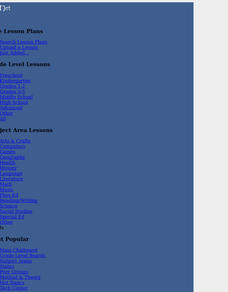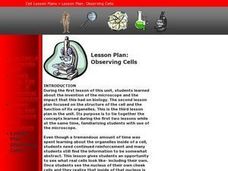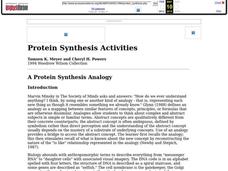Curated OER
Tree Friends
Students are introduced to tree structure and use. They identify their special tree using all senses except sight. Students identify six different internal parts within a cross section of tree trunk (bark, phloem, xylem, cambium,...
Curated OER
Homologous Shoes
Students examine the concept of homology by observing their shoes and those of their classmates. They summarize the observations of everyone's shoes relating it to chromosomes in cells. They share their observations with the class.
Curated OER
TE Activity: Racing with the Sun - Creating a Solar Car
Students use a purchased kit to build a solar powered car. They connect a solar photovoltaic panel to a motor which runs the car forward and backward. They determine how to wire the car to move in both directions.
Serendip
From Gene to Protein - Transcription and Translation
Learners identify the different steps involved in DNA transcription. In this genetics lesson, pupils complete a worksheet and model the translation process with a paper chain activity. They watch a video on sickle cell anemia and explain...
Clean Up Australia
Why are Batteries Harmful to the Environment?
Open this lesson by reading together about primary and secondary batteries (such as nickel-cadmium cells), problems they can cause in the environment, and how humans can minimize the damage. Afterward, little ones examine a collection of...
Curated OER
Surface to Volume Ratios
Students measure the rate of diffusion and to calculate the surface area to volume ratios of varying cell sizes. The lesson is very clearly organized with a useful student worksheet provided. They perform a lab experiment which is...
Curated OER
DNA Extraction
Students extract and observe a visible amount of DNA from Escherichia. coli cells. They discuss the properties of DNA. Confirmation of the presence of DNA by a reaction with an indicator is confirmed within this lesson. Many hands-on...
Curated OER
Activities of the Immune System (Activity 1)
Students cut an apple in half and cover half with plastic wrap. They place drops of liquid on each half and discover how our skin protects us. They answer discussion questions to end the lesson.
Curated OER
Protein Synthesis Activities
Pupils compare the process of protein synthesis in an analogy. They simulate the process of protein synthesis kinesthetically using index cards and write a paragraph to explain the process.
Curated OER
DNA and Protein Synthesis in the Cell
Learners explore how DNA fits into chromosomes and how chromosomes relate to the human body. Students learn about DNA replication and protein synthesis and model these two processes.
Teach Engineering
Microfluidic Devices and Flow Rate
When you have to flow, you have to flow. The activity introduces class members to microfluidic devices and their uses in medicine. They watch a short video on how the diameter affects the rate of flow. The worksheet has individuals...
University of Minnesota
Neurotransmission Model
Don't lose your marbles — you'll need them for a lesson on neurotransmission. Young scholars build a neurotransmission model using marbles, beads, rubber bands, string, and other elements. After studying specific neurotransmitters,...
University of Minnesota
What's the Deal? Addiction Card Game
Addiction is a big deal! Playing a game of cards helps learners understand the concept of addiction. Through their analysis, they examine the potential for addiction and how it varies for each individual.
LABScI
Photosynthesis: How Do Plants Get Energy?
Examine the mechanism of photosynthesis through different light scenarios. Pupils vary the amount and type of light exposure on plant leaves in the fifth lesson plan in a 12-part series. Through observation, they determine the rate of...
Curated OER
Strawberry Smoothies
Biologists extract the DNA from a strawberry. After completing the procedure, learners write answers to a few questions on the lab sheet provided. This is ideal lab practice during a DNA unit in your general biology course.
Forest Foundation
The Nature of Trees
Young botanists examine the different parts of tress and then draw parallels between the functions of these parts and the function of parts of the human body.
Curated OER
The Meaning of Genetic Variation
Students investigate variation in the beta globin gene by identifying base changes that do and do not alter function, and by using several Internet-based resources to consider the significance in different environments of the base...
Curated OER
Using the Microscope
Students demonstrate their ability to properly make observations using a compound microscope. They prepare an onion skin slide and focus on it in both low and high power. Then they measure the diameter of one of the cells.
Curated OER
Controlling the Code: Molecules at Word
Young scholars investigate how cells determine which genes will be expressed and which will be silent. In this genetics lesson, students use on-line resources to complete a worksheet and gather information about gene regulation. Lesson...
Curated OER
Translating Genetic Information
Students explore the process of translation. They determine the correct sequencing and present their strands to the class. In addition, they compare normal red blood cells to sickle cells and complete discussion questions.
Curated OER
Investigating DNA
High schoolers engage in a variety of activities designed to facilitate the understanding of DNA. Activities include preparing human chromosome spreads, separating a mixture of dyes using gel electrophoresis and extracting DNA from onion...
Curated OER
TE Lesson: What's Dominant?
Students study the number of chromosomes in the body cells, sperm cells, and egg cells of humans. They define allele, and examine the difference between dominant and recessive alleles. They complete an activity with jelly beans that...























